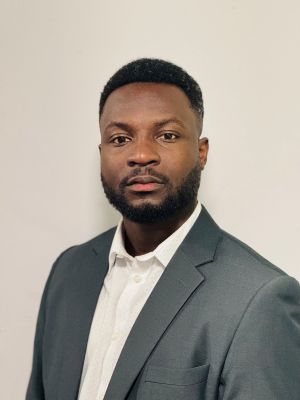“It’s not just the knowledge itself, but the confidence it gives others in your capability when they see the NEBOSH name on your CV.”
Case Study: Jonathan Biney
We spoke to Jonathan Biney who served in the British Army for 15 years. Now, a Quality Health Safety Environmental Manager for Veolia Dewatering & Maintenance Solutions. We ask him about his experience transitioning from the Armed Forces to a career in health and safety, as well as getting some great advice about those considering transitioning can do the same.

Jonathan, please can you tell me about your background in the British Army and why you chose health and safety as a career to transition into?
I served in the British Army for 15 years, promoted to the rank of Senior Non-Commissioned Officer (Sergeant). Over the years, I held various Quality, Health, Safety and Environmental (QHSE) roles across operational, instructional, and safety-critical environments.
My journey in health and safety began in the early stages of my career, when I noticed how integral safety protocols were to the success and survival of military operations. I became particularly drawn to the discipline, which only deepened later in my career as I faced personal challenges that brought psychosocial safety and mental health to the forefront of my life and work. Some of my key roles included DSEAR Manager and Warehouse Safety & Risk Manager.
Transitioning from the forces into civilian industry wasn’t without its challenges. But despite not completing formal resettlement, I secured a position before my last day of service; appointed as the Health Safety & Environmental Manager for Castings Technology International Ltd. (UK’s only commercial titanium casting foundry manufacturing parts of the F-35 fighter jet). I now serve as the Quality Health Safety Environmental Manager at Veolia. I also have the privilege of sitting on the Council of the International Institute of Risk & Safety Management (IIRSM) as a Trustee, providing strategic oversight to a globally respected professional body.
Did you use your Enhanced Learning Credits (ELCAS)?
Education has played a vital role in my transition. I used ELCAS funding to complete both my undergraduate (Logistics, specialising in Health & Safety Management) and postgraduate studies, which I am currently completing (NEBOSH MSc in Occupational Health, Safety & Environmental Management at the University of Hull, final year student).
Which NEBOSH qualifications do you currently have?
In terms of NEBOSH qualifications, I hold the NEBOSH National General Certificate in Occupational Health and Safety (NGC). I chose NEBOSH because of its strong industry reputation; the qualifications are widely regarded as the benchmark in health and safety. I found the content to be comprehensive, practical, and aligned with real-world demands.
When did you choose to take the National General Certificate? Were you still in the forces, or was it recommended to you?
I undertook the NEBOSH National General Certificate as part of a long-held personal development objective, which I set for myself following the successful completion of my dangerous goods certification. That training deepened my interest in health, safety, and environmental (HSE) management, particularly in the context of hazardous materials, and inspired me to broaden my capabilities further.
It was entirely my own initiative and done while I was still in the forces, with a view to ensuring I was well-prepared for a smooth and meaningful transition into civilian roles within HSE.
How have NEBOSH qualifications helped you progress in your current role?
Studying for the NEBOSH MSc at the University of Hull has been a turning point in my professional development. The course anchors academic learning to real-world workplace challenges, which has allowed me to directly apply advanced modules like Advanced Risk Management, Corporate Social Responsibility (CSR) in HSE, Mental Health, and Project Management to my leadership role at the International Institute of Risk & Safety Management (IIRSM - a global risk and safety organisation). The NEBOSH National General Certificate qualification has also helped shape my competence and instilled in me a strategic mindset. The NGC qualification has been instrumental in formalising the knowledge and experience I gained during my military service. It provided a structured understanding of civilian regulatory frameworks, bridging the gap between military standards and civilian expectations. In my role as QHSE Manager at Veolia, the NEBOSH NGC has added credibility to my professional profile and has supported my ability to influence and lead on health and safety matters. It’s not just the knowledge itself, but the confidence it gives others in your capability when they see the NEBOSH name on your CV.
What is the best piece of advice you have been given throughout your career in the forces?
Improvise. Adapt. Overcome.
That mantra shaped my military career, and it’s been just as relevant in civilian life. No two challenges are the same, and success often depends on your agility and mindset more than your plan.
What advice would you give to those considering transitioning into a career in health and safety?
Start early. Learn continuously. Apply anyway.
Your rank won’t carry the same weight outside, but your ability will. The civilian world doesn’t salute titles; it rewards results. Since leaving the army, I’ve worked in senior leadership roles across sectors and now serve on the IIRSM’s Board of Trustees, as one of the Trustees. Yet I’m still regularly approached by officers, commissioned and warrant alike, worried their rank won’t translate. And often, it doesn’t. Meanwhile, I’ve seen Privates with fewer years of service but the right qualifications secure serious leadership roles because they were prepared and confident. I never did formal resettlement, but I started preparing from day one, stacking qualifications like NEBOSH, taking tough assignments, and staying curious. In this sector, incompetence is exposed quickly. The system is lean and performance driven. That’s not something to fear; it’s something to embrace.
